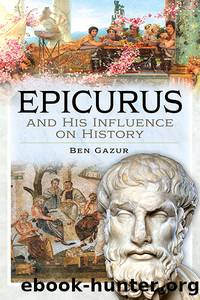Epicurus and His Influence on History by Ben Gazur;

Author:Ben Gazur;
Language: eng
Format: epub
Tags: BIOGRAPHY & AUTOBIOGRAPHY / Philosophers
Publisher: Casemate Publishers & Book Distributors, LLC
Published: 2023-06-02T00:00:00+00:00
Others of the Garden
The Garden was one of the most accessible schools of philosophy in ancient Athens. Anyone who had an interest in philosophy seems to have been able to sit at the tables set out there. Of course, the Garden, or its members, were rather more choosey about who could become a member. If you have sought to have a discussion with people you will be acutely aware that some people do not lend themselves to productive dialogue. Some are downright annoying, not to be included in a space devoted to pleasure.
Lessons had been learned from Socrates too. If you made your philosophy too accessible, say by harassing everyone trying to go about their business in the agora, then you were going to have a bad time. The ideal the Epicureans discovered was to wall themselves off but also, to have an open door.
It was a very open door compared to some of the other schools of philosophy of the day. Leontion, for instance, was not the only woman to be a member of the Garden. We know that Themista, wife of Leonteus, was close to Epicurus. Later sources such as Clement of Alexandria recalled her devotion to philosophy and Epicureanism. He says that Themista, daughter of Zoilus, was from Lampsacus and learned philosophy from her husband. Lactantius went to so far as to say that Themista was the only woman in the memory of mankind who had ever learned philosophy, which perhaps says something about the women who knew Lactantius not wanting to discuss philosophy with him. He also claims that Epicurus âinvites those who are altogether unacquainted with letters to philosophyâ and âwill receive the ignorantâ.
She is not known to have written any philosophy herself but she was a recipient of several letters, quoted by Diogenes Laertius. In one, Epicurus grew quite giddy with excitement at seeing the couple saying he would whirl three times on the spot and go to wherever they want to meet him.
Epicurus even dedicated one of his works, Neocles, to Themista. In later centuries Cicero would mock him for paying attention to her rather than famous men. Epicurus devoted huge books to Themista but never once mentioned famous men like Solon, Themistocles, or Lycurgus, he says.
The affection between Epicurus and Themista and Leonteus was reciprocated. The couple named their son Epicurus after their friend.
Much study has been given to the idea of women in the Garden. Because this goes against so much of what is known about how the ancient Greek world operated, many have questioned the idea of women, let alone hetaerae, in the school. Some scholars point to the names given in sources to the women of the Garden. Were there really women whose names can be translated as âTits,â âOx-eyesâ and âPleasantâ thronging to hear lectures from Epicurus?
Intriguingly a partial inscription from the early third century BCE tells us that these names were not spiteful jokes at Epicurusâ expense but really did belong to women and could even be used in the context of worship.
Download
This site does not store any files on its server. We only index and link to content provided by other sites. Please contact the content providers to delete copyright contents if any and email us, we'll remove relevant links or contents immediately.
| France | Germany |
| Great Britain | Greece |
| Italy | Rome |
| Russia | Spain & Portugal |
Fanny Burney by Claire Harman(25793)
Empire of the Sikhs by Patwant Singh(22185)
Out of India by Michael Foss(16315)
Leonardo da Vinci by Walter Isaacson(11921)
Small Great Things by Jodi Picoult(6108)
The Six Wives Of Henry VIII (WOMEN IN HISTORY) by Fraser Antonia(4800)
The Wind in My Hair by Masih Alinejad(4428)
The Lonely City by Olivia Laing(4128)
The Crown by Robert Lacey(4115)
A Higher Loyalty: Truth, Lies, and Leadership by James Comey(4041)
The Iron Duke by The Iron Duke(3652)
Millionaire: The Philanderer, Gambler, and Duelist Who Invented Modern Finance by Janet Gleeson(3576)
Sticky Fingers by Joe Hagan(3458)
Alive: The Story of the Andes Survivors by Piers Paul Read(3321)
Papillon (English) by Henri Charrière(3280)
Joan of Arc by Mary Gordon(3271)
Stalin by Stephen Kotkin(3091)
Aleister Crowley: The Biography by Tobias Churton(3026)
Ants Among Elephants by Sujatha Gidla(2928)
